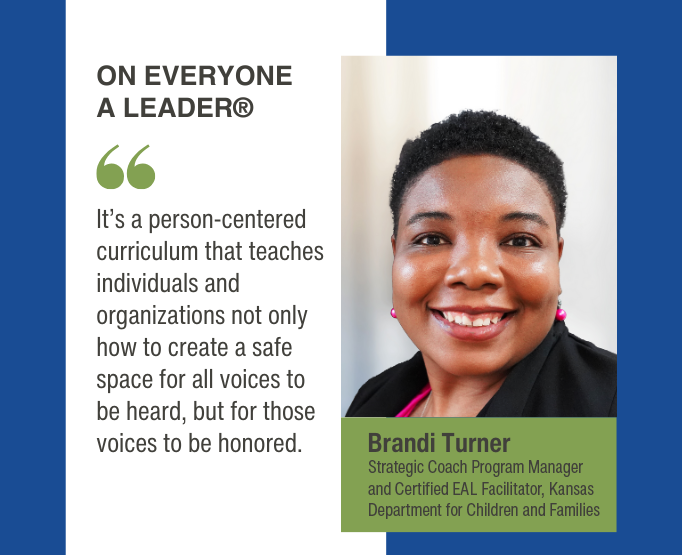On Everyone A Leader®
By Brandi Turner, Strategic Coach Program Manager and Certified EAL Facilitator, Kansas Department for Children and Families
May 2023
There are many great examples of how Everyone A Leader (EAL) stands apart from traditional leadership curricula. It doesn’t simply tell you what it takes to be an effective leader, it shows you how to be an effective leader. It provides you with the tools you need to turn your ideas into action. It demonstrates the necessity of valuing all the voices that make up an organization–from clerical staff to CEOs.
But as an African-American woman who has navigated workplaces where voices are too often silenced, I believe that EAL’s greatest attribute is something even more powerful: Its ability to create a culture of belonging, and, in the process, help people heal.
For those who have spent their professional careers in top-down organizational cultures, who have grown accustomed to swallowing their opinions and doing whatever management tells them to do, EAL can be a game changer. That’s why, when I had an opportunity to become a certified EAL facilitator, I immediately saw its value.
How does EAL achieve that value? Simple. It’s a person-centered curriculum that teaches individuals and organizations not only how to create a safe space for all voices to be heard, but for those voices to be honored. In my capacity as Strategic Coach Program Manager at the Kansas Department for Children and Families, I have heard stories from people who have spent their careers feeling as if they’re on the sidelines of decision-making. EAL shows organizations how to bring them onto the playing field as respected participants whose ideas are worthy of being put into action.
Watching one’s idea take off and have an impact on an organization is a powerful thing to behold. It makes you feel like you belong to that organization, that you are having an effect on moving its mission forward. But to get to that point, as EAL demonstrates, you have to give employees the opportunity to reflect, to speak, to tell their stories.
This is where the EAL curriculum comes in. For the great majority of the course, I follow the EAL curriculum as it was designed by its creator, TeamTech co-founder and CEO, Kathleen Harnish McKune. But at key moments I give participants the time and space to reflect on their experiences in the workplace. These moments are opportunities for people to tell their stories in a safe, judgment-free environment.
I have found that it is in these moments of reflection where people find their experiences validated. This validation, in tandem with the EAL curriculum, demonstrates that it is possible to create a process where everyone in the workplace is empowered to participate, where everyone is heard. I can’t think of anything more healing than this simple act of letting all employees know they belong, that their presence makes a difference. And once they feel like they belong, they begin to lead.

